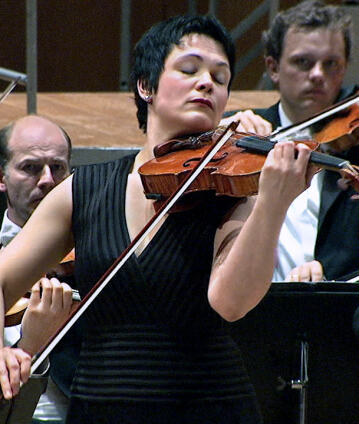Bartók’s Viola Concerto with Tabea Zimmermann and Semyon Bychkov

Béla Bartók’s virtuoso Viola Concerto makes a strong case for an often underrated instrument – especially when it is performed by the internationally acclaimed violist Tabea Zimmermann. “She plays the concerto with a tender cantabile as if it were by Mozart,” as one critic wrote. Conductor Semyon Bychkov also presents Ravel’s delicate Tombeau de Couperin and Brahms’ sunlit Second Symphony.
This concert takes us from the West to Eastern Europe with works by Maurice Ravel, Johannes Brahms and Béla Bartók, presented by conductor Semyon Bychkov and violist Tabea Zimmermann. All three of this concert’s works are conceptually most intriguing: Ravel’s Tombeau de Couperin, for example, is characterised by a playful use of Baroque dance music with an underlying mood which, at the same time, is melancholic. Brahms’ Second Symphony enchants with its cheerful mood – yet, below its idyllic surface, a highly complex texture is revealed, which is why the composer himself described the work as a “lovely monster”. Finally, there is Bartók’s Viola Concerto, where the virtuoso solo part brings to the centre of attention an instrument whose contribution to the whole is normally made from the body of the orchestra, a contribution which is not infrequently underestimated.
At the time of this concert, Semyon Bychkov had been appearing with the Berliner Philharmoniker for almost a quarter of a century. Eastern European works in particular had played a significant role in this partnership, plus German Classicism and Romanticism and the occasional French piece, including works by Poulenc and Berlioz. In this respect, it was quite a representative programme Bychkov conducted in this concert. In the Bartók concerto, the soloist was violist Tabea Zimmermann who made her debut with the Berliner Philharmoniker with the same work in 1992.
© 2010 Berlin Phil Media GmbH
Related interview
Artists
Our recommendations
- François-Xavier Roth and Tabea Zimmermann
- Semyon Bychkov conducts Richard Strauss’s “Alpine Symphony”
- Semyon Bychkov conducts Strauss and Schubert
- Semyon Bychkov and Menahem Pressler
- Works by Dmitri Shostakovich and Arnold Schoenberg with Semyon Bychkov and Guy Braunstein
- Semyon Bychkov and Gautier Capuçon